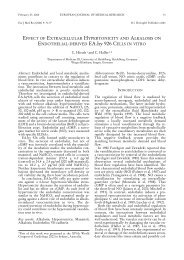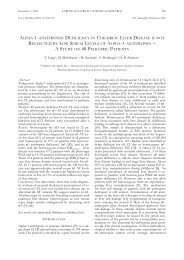European Journal of Medical Research - Deutsche AIDS ...
European Journal of Medical Research - Deutsche AIDS ...
European Journal of Medical Research - Deutsche AIDS ...
You also want an ePaper? Increase the reach of your titles
YUMPU automatically turns print PDFs into web optimized ePapers that Google loves.
June 27, 2007 EUROPEAN JOURNAL OF MEDICAL RESEARCH<br />
39<br />
year-olds) regarded <strong>AIDS</strong> as being one <strong>of</strong> the most dangerous<br />
diseases. This figure declined steadily. In 2006 only 29% <strong>of</strong><br />
the general and 43% <strong>of</strong> the young population rated <strong>AIDS</strong> as<br />
one <strong>of</strong> the most dangerous diseases. Since the mid 1990s between<br />
70% and 80% <strong>of</strong> the general as well as the young population<br />
is certain about the fatal course <strong>of</strong> <strong>AIDS</strong>. In 2006 6% <strong>of</strong><br />
young people were holding the view that <strong>AIDS</strong> could be<br />
cured.<br />
Experience with condom use among the German population<br />
has spread substantially since the start <strong>of</strong> the <strong>AIDS</strong> education<br />
campaign. In 1991 76% <strong>of</strong> the 16 to 65 year-olds and 67% <strong>of</strong><br />
the 16 to 20 year-olds had experience with condoms. This<br />
proportion increased to 90% percent in the general and to<br />
76% in the young population in 2006.<br />
A substantial increase in condom possession can be determined.<br />
In 1991, 32% <strong>of</strong> the general and 37% <strong>of</strong> the young<br />
population said they had condoms at home or with them. In<br />
2006 46% <strong>of</strong> the general population and 68% <strong>of</strong> the younger<br />
people had condoms available.<br />
<strong>AIDS</strong> is considered to be far less <strong>of</strong> a threat than in the past<br />
decade. Nevertheless, the majority <strong>of</strong> the German population<br />
still views HIV/<strong>AIDS</strong> as a fatal disease. Preventive health<br />
care aims at achieving and maintaining a high level <strong>of</strong> public<br />
knowledge about HIV/<strong>AIDS</strong>. Promoting safer sex constantly<br />
has lead to increased experience with and availability <strong>of</strong> condoms<br />
especially in young people.<br />
A.35 (Poster)<br />
Knowledge, attitudes and behaviour with regards<br />
to HIV and STIs among young adults in Germany,<br />
Poland Austria, Slovak Republic, Italy and<br />
Slovenia – a BORDERNET cross border survey<br />
Sokolowski S. 1 , Steffan E. 1 , Arsova Netzelmann T. 1<br />
1 SPI Forschung gGmbH, Berlin, Germany<br />
Objectives: Young people’s risk exposure to HIV/<strong>AIDS</strong> and<br />
STI is confirmed not only by recent data on new HIV infections,<br />
but also by a variety <strong>of</strong> socio-demographic, cultural and<br />
psychosocial factors related to the age <strong>of</strong> experimentation and<br />
unsettled search <strong>of</strong> (sexual) identity. Carried out in the frame<br />
<strong>of</strong> the EC-funded Project BORDERNET, the survey aims to<br />
identify sexual risk indicators related to knowledge, attitudes,<br />
sexual practices and cross-border mobility <strong>of</strong> <strong>European</strong> young<br />
adults from 6 EU member states.<br />
Methods: A KAB survey comprising additional items on<br />
cross border mobility conducted through a self-administration<br />
questionnaire. Based on preliminary defined selection criteria<br />
<strong>of</strong> risky youth venues, 1085 young adults aged 18 to 25 years<br />
were recruited in border regions <strong>of</strong> Austria, Germany, Italy,<br />
Poland, Slovakia and Slovenia.<br />
Results: Young adults exhibit in general high basic knowledge<br />
<strong>of</strong> HIV/STIs. At the same time various uncertainties exist<br />
related to widespread myths <strong>of</strong> infection and protection,<br />
which influence respondents from the new EU member states<br />
stronger. About a quarter (26%) <strong>of</strong> the young adults (with a<br />
considerable share <strong>of</strong> Germans among them) does not have information<br />
about the availability <strong>of</strong> anonymous and free-<strong>of</strong>charge<br />
HIV counselling and testing <strong>of</strong>fers. This may impact<br />
negatively their help-seeking behaviour. Gender and crosscountry<br />
comparisons show that the young women and the respondents<br />
from old EU member states (especially the Austrians<br />
and the Germans) tend more to single-partner relationships<br />
as a risk management strategy and state to chose more<br />
<strong>of</strong>ten the “no condom, no sex” self-protective behaviour.<br />
Young men, as well as respondents from Mediterranean countries<br />
(Italy, Slovenia) predominate among those with multiple<br />
sexual partners, and partly with condom-unfriendly attitudes.<br />
Nevertheless, men in general report more <strong>of</strong>ten condom use<br />
than women and rely more on their assertiveness skills at the<br />
condom negotiation.<br />
Conclusions: The identified narrow link between condom use<br />
and prevention <strong>of</strong> unwanted pregnancy confirms unambiguously<br />
the importance <strong>of</strong> integrative prevention approaches,<br />
which embed the HIV/<strong>AIDS</strong> and STIs education into the<br />
wider frame <strong>of</strong> the sexual and reproductive health <strong>of</strong> young<br />
adults.<br />
A.36 (Poster)<br />
HIV prevention among MSM in the Ukraine<br />
Traute A. 1<br />
1 Connect plus, Berlin, Germany<br />
An Ukrainian-German working group conducted a study<br />
among HIV-positive and HIV-negative MSM (men who have<br />
sex with men) per in-depth interviews and questionnaires between<br />
August and November 2006. The aim was to obtain information<br />
about prevention deficits and ways to HIV prevention<br />
among MSM in the Ukraine - a work that has long been<br />
neglected and only recently is conducted with the aid <strong>of</strong> international<br />
donors. 16 in-depth interviews about all aspects <strong>of</strong><br />
sexual experience and sexual behaviour, safer sex and the perceived<br />
attitude <strong>of</strong> Ukrainian society and MSM communities<br />
were conducted. Parallel, 200 MSM were interviewed per paper<br />
and pencil questionnaire about the same aspects. During<br />
the recruiting phase, stress was laid on the goal to recruit<br />
MSM from various social sub-groups (MSM identified as gay,<br />
bisexual, hidden, with incarceration experience, sex workers).<br />
The in-depth interviews were performed by trained peers <strong>of</strong><br />
the respective sub-group in order to allow access to that<br />
scene. The project also served as capacity building measure<br />
for the Ukrainian project partners.<br />
One <strong>of</strong> the main results was that risky sexual behaviour<br />
takes place, when sex partners feel being or are discriminated<br />
by the society because <strong>of</strong> to their sexual preferences, or by the<br />
MSM community due to their HIV-Status. In these cases, for<br />
example no communication about safer sex and protection<br />
steps takes place in sexual situations. Psychological factors <strong>of</strong><br />
risky behaviour are perceived chronic stress (tension), perceived<br />
discrepancies between own knowledge, own beliefs<br />
and principles and performed behaviour. The group <strong>of</strong> nottested<br />
MSM can be silhouetted against tested MSM with regard<br />
to anonymity <strong>of</strong> sexual contacts and lacking protective<br />
behaviour. Knowledge deficits seem to play no role in risky<br />
behaviour. In general, initiation <strong>of</strong> sex contacts via internet<br />
has become widespread. Prevention measures should first <strong>of</strong><br />
all be implemented on accordant websites.<br />
The study was supported by UN<strong>AIDS</strong> (No. IR.UKR.USC.<br />
226.UA.04.G (999.51)) by funds from the German Federal Ministry<br />
<strong>of</strong> Health, and was scientifically supervised by a member <strong>of</strong> Public<br />
Healt Group at Centre for Social Studies (Wissenschaftszentrum)<br />
Berlin.





